- Home
- Malorie Blackman
Unheard Voices Page 2
Unheard Voices Read online
Page 2
He looked at Ajeemah. ‘What?’
‘A word with you.’
His gun hitched up on him, the bulky-limbed, bearded African came close and asked, ‘What you want?’
Ajeemah said, ‘Where am I going? What’s going to happen to me?’
‘Don’t worry. You won’t be eaten.’ The kidnapper slave trader said that because of a long-standing belief circulating among captives that white men bought them to eat them.
‘Then tell me, how long will I be away?’
‘It’s up to your buyer to tell you that.’
‘I beg you, do a kind favor for me.’
‘What’s that?’
‘Do get a message to my women and children for me. Tell them Ajeemah – Ajeemah and Atu – say we’ll be back soon. First chance! First chance we’ll be back.’
‘Forget it. I don’t even know where you come from.’
‘Remember where you got me and my son? Remember? Ask. And get a message to Ahta the Twin – father of my son’s bride-to-be. Tell Ahta—’
‘Forget it, man. Forget it! I don’t know where you come from.’
‘I’ll tell you. Get a message and I return a good deed for you one day. I come from—’
‘Listen. Most I can do for you is to get you in with the best captain I can. D’you hear me?’ The slave trader began walking away.
Ajeemah was desperate. He shouted, ‘You must do something. You must! My four-year-old son, my son of birth pangs I shared, my Kufuo, must know I’m coming back. He must know!’ The slave trader stood and watched his desperate captive. Ajeemah pleaded more quietly. ‘My little fellow must know something. No good-byes linger with us. No last tender feeling exchanged – to sustain us! Say you’ll get a message – to my family. Please!’
The kidnapper despised Ajeemah for talking like that. He looked at Ajeemah as if he’d just disgraced himself shockingly. ‘You’ve looked like a prince,’ he said, ‘and behaved like a warrior, till now.’ He waddled away and went on with the supervising of his slaves being made ready for sale. And standing in groups, black faces, chests, arms and legs well oiled and shining, the people were put on show for the white captains of the waiting ships to come and choose their purchase.
Ajeemah and Atu had never seen a white man. They held in their tension and terror and watched the strange creatures. Ajeemah wondered if his flesh would end up in the flesh of one of the white men in captain’s hat and high boots.
In a stream of captured people, Ajeemah and Atu were taken on board ship that same day. Other slave passengers were already there. By the end of the day the ship was full of sad, frightened, grief-stricken and wildly angry people chained up together. Over three hundred of them, they lay side by side on fittings like layers of shelves.
When the ship pulled away, noisy weeping and sobbing broke out. Screams of terror rose up and ripped through the decks and echoed back to land. And as the coast of Africa disappeared, a long-drawn-out groan of grief rose up together steadily from the people one after another, till all died away into silence.
Daniel Aloysius Francis
A Day in the Life
The poem on the next two spreads contrasts two different viewpoints of the same experience.
As he looks down at me, and I look up at him.
And I see his white skin,
No differences between me and him,
so he speaks a foreign tongue, we are all unique
but all built the same way.
THUD! I hit the ground; the pain is so loud
When I hit the floor,
I wake up.
I’m home.
The birds are singing, soil between my toes, wind on my hair,
family everywhere, so I just stand and stare.
Nothing’s changed and I’m thankful that God made me
This way.
I see my family, so I run to try and greet them,
I’m torn away, I just can’t reach them, and every step I take is
dragging me backwards.
The birds stop singing, the soil splashes at my feet, blood in my
hair,
I just don’t know where I am.
I wake up, huddled bodies all around me, women screaming, men
chanting, babies crying and
the sound of the majestic sea.
I just don’t know where I am,
Am I really here?
Why has God forsaken me and taken away all I hold dear?
Is this the work of Lucifer and his white devils?
Is this my life now huddled deep in the
under world of a distant ship miles from home?
Under the light of the white man’s prison I see the squalor
and the sound of salt on open wounds.
It doesn’t matter if their skin is white on the surface,
What matters is the evil found underneath!
This is just another average day in the life . . .
* * *
As he looks up at me, and I look down at him.
I look in his eyes and around the face, so I whip his black skin
back until he’s unconscious.
Knowing the work I’m doing is righteous.
Delivering the children of God away from sin and savagery,
. . . Into a life of prayer and democracy,
so what if I’m earning a dime a dozen?
Is this not the work of God?
Is this not a deliverance from evil and sin?
Is this not my right to provide for my family doing
the work of God?
So when I die and go to heaven,
I hope I’m rewarded for all this righteous work,
The birds singing, soil between my toes, wind on my face,
family everywhere, a place I can just stand and stare.
Meanwhile I wait for the rewards waiting me in my next life,
transporting all these niggers to the new world,
No matter the murder or strife.
Below deck I hear chanting, of the sinner’s world
so I splash more salt on those wide open wounds.
Helping destroy the world of the past and
kill any essence of such savagery,
Why has God blessed me?
Why has Lucifer forgotten about his black devil tongue?
Is this the work of God and those white, white arch angels?
This is my life now delivering sinners from a distant hell,
on this God-given ship, miles from home.
This is just another average day in the life . . .
ALEX HALEY
Extract from:
Roots
Roots is the story of Kunta Kinte, born in the village of Juffure in The Gambia, West Africa, in the middle of the eighteenth century. When he is seventeen, Kunta is captured by slave catchers while he is looking for wood near his home. He is beaten savagely and when he regains consciousness, Kunta finds himself in a waking nightmare on board a slave ship bound for America . . .
Kunta wondered if he had gone mad. Naked, chained, shackled, he awoke on his back between two other men in a pitch darkness full of steamy heat and sickening stink and a nightmarish bedlam of shrieking, weeping, praying, and vomiting. He could feel and smell his own vomit on his chest and belly. His whole body was one spasm of pain from the beatings he had received in the four days since his capture. But the place where the hot iron had been put between his shoulders hurt the worst.
A rat’s thick, furry body brushed his cheek, its whiskered nose sniffing at his mouth. Quivering with revulsion, Kunta snapped his teeth together desperately, and the rat ran away. In rage, Kunta snatched and kicked against the shackles that bound his wrists and ankles. Instantly, angry exclamations and jerking came back from whomever he was shackled to. The shock and pain adding to his fury, Kunta lunged upward, his head bumping hard against wood – right on the spot where he had been clubbed by the toubob1 back in the woods. Gasping and snarling, he and the unseen man next to him battered their iron cuffs at each other until both slumped back in exhaustion. Kunta felt himself starting to vomit again, and he tried to force it back, but couldn’t. His already emptied belly squeezed up a thin, sour fluid that drained from the side of his mouth as he lay wishing that he might die.
He told himself that he mustn’t lose control again if he wanted to save his strength and his sanity. After a while, when he felt he could move again, he very slowly and carefully explored his shackled right wrist and ankle with his left hand. They were bleeding. He pulled lightly on the chain; it seemed to be connected to the left ankle and wrist of the man he had fought with. On Kunta’s left, chained to him by the ankles, lay some other man, someone who kept up a steady moaning, and they were all so close that their shoulders, arms, and legs touched if any of them moved even a little.
Remembering the wood he had bumped into with his head, Kunta drew himself upward again, just enough for it to bump gently; there wasn’t enough space even to sit up. And behind his head was a wooden wall. I’m trapped like a leopard in a snare, he thought. Then he remembered sitting in the darkness of the manhood-training hut after being taken blindfolded to the jujuo so many rains before, and a sob welled up in his throat; but he fought it back. Kunta made himself think about the cries and groans he was hearing all around him. There must be many men here in the blackness, some close, some farther away, some beside him, others in front of him, but all in one room, if that’s what this was. Straining his ears, he could hear still more cries, but they were muffled and came from below, beneath the splintery planking he lay on.
Listening more intently, he began to recognize the different tongues of those around him. Over and over, in Arabic, a Fulani was shouting, ‘Allah in heaven, help me!’ And a man of the Serere t
ribe was hoarsely wailing what must have been the names of his family. But mostly Kunta heard Mandinkas, the loudest of them babbling wildly in the sira kango secret talk of men, vowing terrible deaths to all toubob. The cries of the others were so slurred with weeping that Kunta could identify neither their words nor their languages, although he knew that some of the strange talk he heard must come from beyond The Gambia.
As Kunta lay listening, he slowly began to realize that he was trying to push from his mind the impulse to relieve the demands of his bowels, which he had been forcing back for days. But he could hold it in no longer, and finally the feces curled out between his buttocks. Revolted at himself, smelling his own addition to the stench, Kunta began sobbing, and again his belly spasmed, producing this time only a little spittle; but he kept gagging. What sins was he being punished for in such a manner as this? He pleaded to Allah for an answer. It was sin enough that he hadn’t prayed once since the morning he went for the wood to make his drum. Though he couldn’t get onto his knees, and he knew not even which way was east, he closed his eyes where he lay and prayed, beseeching Allah’s forgiveness.
Afterward, Kunta lay for a long time bathing dully in his pains, and slowly became aware that one of them, in his knotted stomach, was nothing more than hunger. It occurred to him that he hadn’t eaten anything since the night before his capture. He was trying to remember if he had slept in all that time, when suddenly he saw himself walking along a trail in the forest; behind him walked two blacks, ahead of him a pair of toubob with their strange clothes and their long hair in strange colors. Kunta jerked his eyes open and shook his head; he was soaked in sweat and his heart was pounding. He had been asleep without knowing. It had been a nightmare; or was the nightmare this stinking blackness? No, it was as real as the scene in the forest in his dream had been. Against his will, it all came back to him.
After fighting the black slatees2 and the toubob so desperately in the grove of trees, he remembered awakening – into a wave of blinding pain – and finding himself gagged, blindfolded, and bound with his wrists behind him and his ankles hobbled with knotted rope. Thrashing to break free, he was jabbed savagely with sharp sticks until blood ran down his legs. Yanked onto his feet and prodded with the sticks to begin moving, he stumbled ahead of them as fast as his hobbles would permit.
Somewhere along the banks of the bolong – Kunta could tell by the sounds, and the feel of the soft ground beneath his feet – he was shoved down into a canoe. Still blindfolded, he heard the slatees grunting, rowing swiftly, with the toubob hitting him whenever he struggled. Landing, again they walked, until finally that night they reached a place where they threw Kunta on the ground, tied him with his back to a bamboo fence and, without warning, pulled off his blindfold. It was dark, but he could see the pale face of the toubob standing over him, and the silhouettes of others like him on the ground nearby. The toubob held out some meat for him to bite off a piece. He turned his head aside and clamped his jaws. Hissing with rage, the toubob grabbed him by the throat and tried to force his mouth open. When Kunta kept it shut tight, the toubob drew back his fist and punched him hard in the face.
Kunta was let alone the rest of the night. At dawn, he began to make out – tied to other bamboo trunks – the figures of the other captured people, eleven of them – six men, three girls, and two children – all guarded closely by armed slatees and toubob. The girls were naked; Kunta could only avert his eyes; he never had seen a woman naked before. The men, also naked, sat with murderous hatred etched in their faces, grimly silent and crusted with blood from whip cuts. But the girls were crying out, one about dead loved ones in a burned village; another, bitterly weeping, rocked back and forth cooing endearments to an imaginary infant in her cradled arms; and the third shrieked at intervals that she was going to Allah.
In wild fury, Kunta lunged back and forth trying to break his bonds. A heavy blow with a club again knocked him senseless. When he came to, he found that he too was naked, that all of their heads had been shaved and their bodies smeared with red palm oil. At around noonday, two new toubob entered the grove. The slatees, now all grins, quickly untied the captives from the bamboo trunks, shouting to them to stand in a line. Kunta’s muscles were knotted with rage and fear. One of the new toubob was short and stout and his hair was white. The other towered over him, tall and huge and scowling, with deep knife scars across his face, but it was the white-haired one before whom the slatees and the other toubob grinned and all but bowed.
Looking at them all, the white-haired one gestured for Kunta to step forward, and lurching backward in terror, Kunta screamed as a whip seared across his back. A slatee from behind grappled him downward to his knees, jerking his head backward. The white-haired toubob calmly spread Kunta’s trembling lips and studied his teeth. Kunta attempted to spring up, but after another blow of the whip, he stood as ordered, his body quivering as the toubob’s fingers explored his eyes, his chest, his belly. When the fingers grasped his foto, he lunged aside with a choked cry. Two slatees and more lashings were needed to force Kunta to bend over almost double, and in horror he felt his buttocks being spread wide apart. Then the white-haired toubob roughly shoved Kunta aside and, one by one, he similarly inspected the others, even the private parts of the wailing girls. Then whips and shouted commands sent the captives all dashing around within the enclosure, and next springing up and down on their haunches.
After observing them, the white-haired toubob and the huge one with the knife-scarred face stepped a little distance away and spoke briefly in low tones. Stepping back, the white-haired one, beckoning another toubob, jabbed his finger at four men, one of them Kunta, and two of the girls. The toubob looked shocked, pointing at the others in a beseeching manner. But the white-haired one shook his head firmly. Kunta sat straining against his bonds, his head threatening to burst with rage, as the toubob argued heatedly. After a while, the white-haired one disgustedly wrote something on a piece of paper that the other toubob angrily accepted.
Kunta struggled and howled with fury as the slatees grabbed him again, wrestling him to a seated position with his back arched. Eyes wide with terror, he watched as a toubob withdrew from the fire a long, thin iron that the white-haired one had brought with him. Kunta was already thrashing and screaming as the iron exploded pain between his shoulders. The bamboo grove echoed with the screams of the others, one by one. Then red palm oil was rubbed over the peculiar LL shape Kunta saw on their backs.
Within the hour, they were hobbling in a line of clanking chains, with the slatees’ ready whips flailing down on anyone who balked or stumbled. Kunta’s back and shoulders were ribboned with bleeding cuts when late that night they reached two canoes hidden under thick, overhanging mangroves at the river’s banks. Split into two groups, they were rowed through darkness by the slatees, with the toubob lashing out at any sign of struggle.
When Kunta saw a vast dark shape looming up ahead in the night, he sensed that this was his last chance. Springing and lunging amid shouts and screams around him, he almost upset the canoe in his struggle to leap overboard; but he was bound to the others and couldn’t make it over the side. He almost didn’t feel the blows of the whips and clubs against his ribs, his back, his face, his belly, his head – as the canoe bumped against the side of the great dark thing. Through the pain, he could feel the warm blood pouring down his face, and he heard above him the exclamations of many toubob. Then ropes were being looped around him, and he was helpless to resist. After being half pushed and half pulled up some strange rope ladder, he had enough strength left to twist his body wildly in another break for freedom; again he was lashed with whips, and hands were grabbing him amid an overwhelming toubob smell and the sound of women shrieking and loud toubob cursing.
Through swollen lids, Kunta saw a thicket of legs and feet all around him, and managing an upward glance while trying to shield his bleeding face with his forearm, he saw the short toubob with the white hair standing calmly making marks in a small book with a stubby pencil. Then he felt himself being snatched upright and shoved roughly across a flat space. He caught a glimpse of tall poles with thick wrappings of coarse white cloth. Then he was being guided, stumbling weakly down some kind of narrow steps, into a place of pitch blackness; at the same instant, his nose was assaulted by an unbelievable stink, and his ears by cries of anguish.

 Girl Wonder and the Terrific Twins
Girl Wonder and the Terrific Twins Betsey Biggalow Is Here!
Betsey Biggalow Is Here! Dangerous Reality
Dangerous Reality Knife Edge
Knife Edge The Stuff of Nightmares
The Stuff of Nightmares Operation Gadgetman!
Operation Gadgetman! Checkmate
Checkmate Love Hurts
Love Hurts Boys Don't Cry
Boys Don't Cry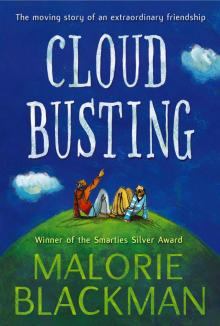 Cloud Busting
Cloud Busting Pig-Heart Boy
Pig-Heart Boy The Deadly Dare Mysteries
The Deadly Dare Mysteries Girl Wonder to the Rescue
Girl Wonder to the Rescue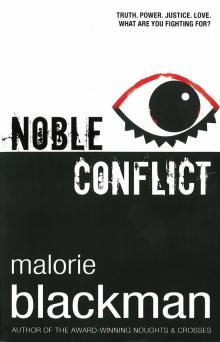 Noble Conflict
Noble Conflict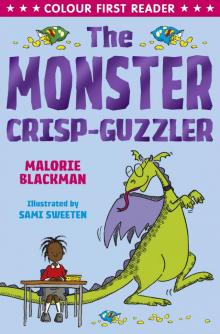 The Monster Crisp-Guzzler
The Monster Crisp-Guzzler Betsey Biggalow the Detective
Betsey Biggalow the Detective Trust Me
Trust Me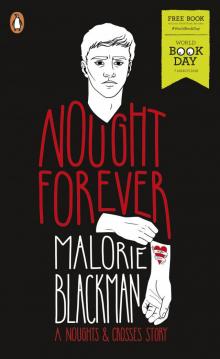 Nought Forever
Nought Forever Betsey’s Birthday Surprise
Betsey’s Birthday Surprise Dead Gorgeous
Dead Gorgeous Jack Sweettooth
Jack Sweettooth Crossfire
Crossfire Girl Wonder's Winter Adventures
Girl Wonder's Winter Adventures Whizziwig and Whizziwig Returns Omnibus
Whizziwig and Whizziwig Returns Omnibus Double Cross
Double Cross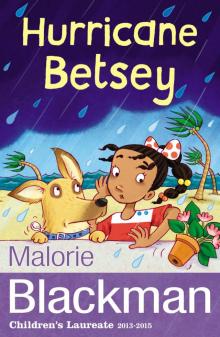 Hurricane Betsey
Hurricane Betsey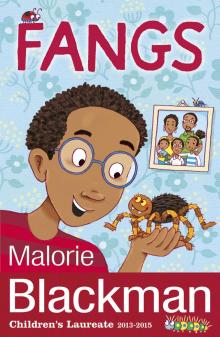 Fangs
Fangs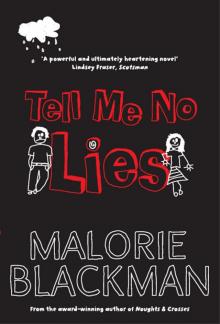 Tell Me No Lies
Tell Me No Lies Chasing the Stars
Chasing the Stars Hacker
Hacker Snow Dog
Snow Dog A Dangerous Game
A Dangerous Game Space Race
Space Race Whizziwig and Whizziwig Returns
Whizziwig and Whizziwig Returns A. N. T. I. D. O. T. E.
A. N. T. I. D. O. T. E.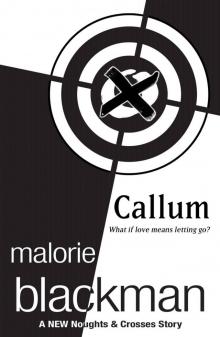 Callum: A Noughts and Crosses Short Story
Callum: A Noughts and Crosses Short Story